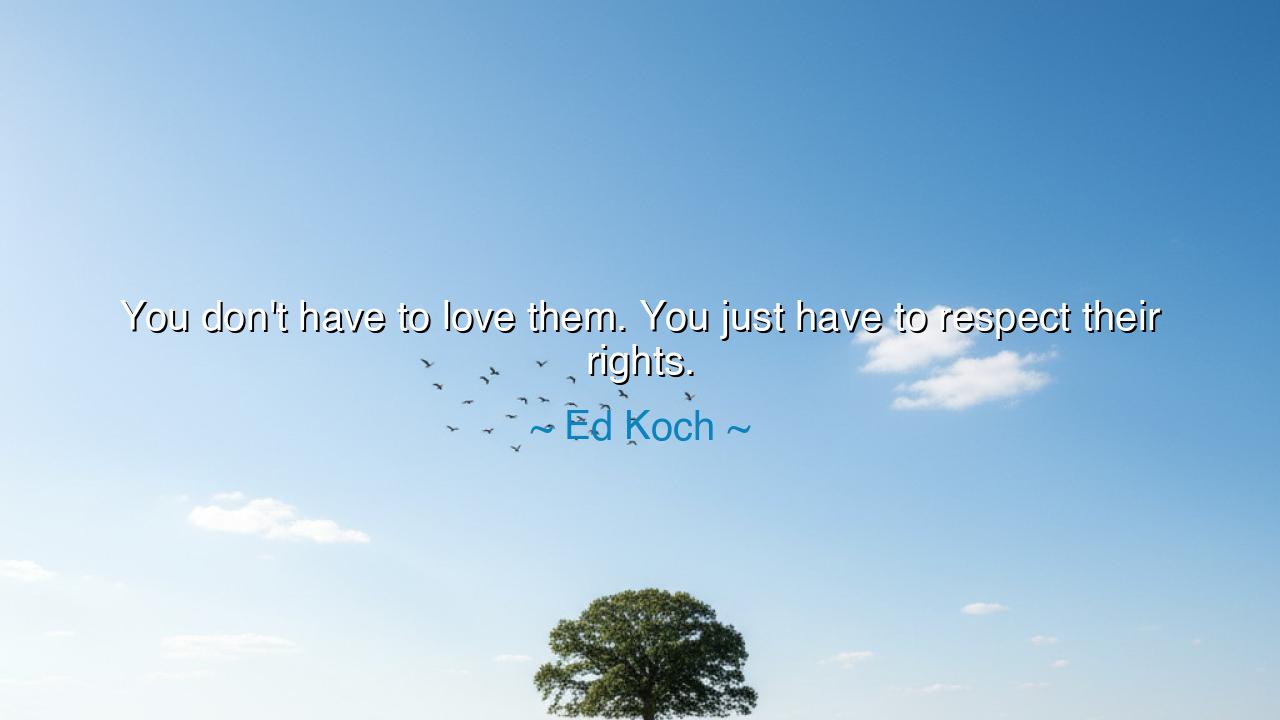
You don't have to love them. You just have to respect their






Hear, O seekers of justice, the words of Ed Koch, the fiery mayor of New York, who declared with clarity: “You don’t have to love them. You just have to respect their rights.” In this saying shines a principle as ancient as law itself—that harmony in a society does not rest upon affection, but upon respect. Love is a gift of the heart and cannot be compelled, but justice demands that the rights of each person be honored, regardless of whether affection exists. Without this, peace becomes impossible, for no city, no nation, no people can endure where rights are trampled underfoot.
The origin of these words comes from Koch’s leadership in a city famed for its diversity and tension. New York was, and remains, a place where countless peoples, faiths, and traditions walk side by side. Koch, seasoned by conflict and sharp of tongue, knew well that not all could live in friendship, nor could all hearts be bound by love. Yet he understood that coexistence required something stronger than emotion: the rule of rights, secured not by sentiment but by principle. His statement was both pragmatic and profound—love your neighbor if you can, but if not, at least honor the boundaries of their dignity.
Consider, O listener, the example of the United States itself, born in fire and vision. The Founding Fathers did not expect men to love one another, nor did they believe affection could govern the affairs of a nation. Instead, they enshrined rights—to speak, to worship, to live free from tyranny. These rights did not require love between neighbors; they required restraint, recognition, and respect. It was through rights, not love, that a fractured people bound together under one law.
In contrast, history also teaches us the folly of societies that demanded uniformity of thought or feeling. In totalitarian regimes, where leaders proclaimed that all must be united in loyalty and affection, the absence of genuine love was replaced with fear. Rights were stripped away in the name of unity, and the result was cruelty, not harmony. Here we see Koch’s wisdom: love may inspire, but respect for rights sustains. When rights are honored, even among strangers, a society can flourish.
This truth also speaks to our daily lives. You may not love your coworker, your neighbor, or even the stranger who disagrees with you. Affection may not be possible, or it may come and go with the winds of emotion. But respect can be constant. By honoring the rights of others—their right to speak, to live, to be free—you uphold the order of justice. This is no small thing, for respect creates space for peace, and in peace, love may one day grow.
O children of tomorrow, take this lesson as armor for your soul: do not demand that all hearts be united in love, for that is beyond the reach of law or reason. Instead, demand that all hands and voices honor rights, for that is within the reach of every person. When you cannot love, respect. When you cannot agree, respect. When you cannot walk together, at least do not strike one another down. In this way, justice lives even when harmony falters.
Practically, this means living with discipline. In your disagreements, do not seek to silence others. In your conflicts, do not trample their dignity. Guard their rights as you would wish yours to be guarded. Speak firmly, but allow them to speak as well. Live freely, but allow them to do the same. For this is the true strength of a just people: not that all are bound by love, but that all are secured by respect.
Thus Ed Koch’s words endure as a guide through division: “You don’t have to love them. You just have to respect their rights.” Let this wisdom be carried forward, for it is the foundation of peace among strangers, the safeguard of justice among the divided, and the hope of freedom in every age.






AAdministratorAdministrator
Welcome, honored guests. Please leave a comment, we will respond soon